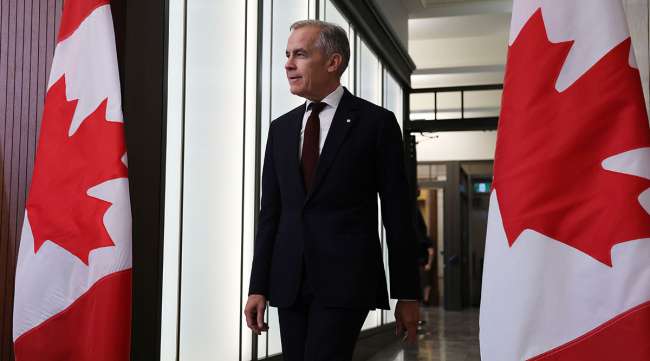Canadian Prime Minister Mark Carney met with the leadership of the Canadian Vehicle Manufacturers’ Association and member executives from the group, which includes GM, Stellantis and Ford. (David Kawai/Bloomberg)
Canadian Prime Minister Mark Carney met with automotive executives July 2 to discuss how to help auto plants that have been choked by U.S. tariffs.
Canada exports most of the vehicles it produces to the U.S., but President Donald Trump has repeatedly said he’ll use tariffs to try to redirect production to the U.S. The White House placed a 25% levy on imports of vehicles from foreign countries in early April, though there’s a provision that lowers the tariff rate for cars and trucks made in Mexico and Canada that use U.S. components.
Still, Canada’s exports of cars and light trucks plunged 23% in April. Trade data for May is set to be released July 3 by Statistics Canada.
General Motors Co., Stellantis NV, Honda Motor Co. and Toyota Motor Corp. all make vehicles in Canada, while Ford Motor Co. owns an assembly plant near Toronto that’s idle. General Motors and Stellantis have reduced shifts at factories in Ontario since the tariffs came into effect.
Carney met with the leadership of the Canadian Vehicle Manufacturers’ Association and member executives from the group, which includes GM, Stellantis and Ford. They discussed negotiations with the U.S. and the work to reach a trade deal by July 21, according to a government statement.
“Carney affirmed that the government’s focus remains on securing the best deal for Canadian workers and industries,” the association said.
Canada shipped about 1.1 million cars and light trucks to its southern neighbor last year. But that trade is a two-way street: Canada is by far the largest importer of U.S.-manufactured vehicles, according to U.S. Commerce Department data.
“The longer the U.S. squeezes us, the more urgent it becomes,” Flavio Volpe, president of Canada’s Automotive Parts Manufacturers’ Association, said in an interview with the Canadian Broadcasting Corp. on July 2.
The Canadian government says the auto tariffs are a clear violation of the U.S.-Mexico-Canada Agreement that Trump signed during his first term.
“The federal government needs to stay laser-focused on securing a deal that eliminates auto tariffs entirely and protects our industry’s future. That means rejecting any version of normalized tariffs,” said Lana Payne, national president of Unifor, a union representing thousands of Canadian autoworkers at General Motors, Stellantis and Ford.
“We will not accept auto tariffs — at any level,” she said.






